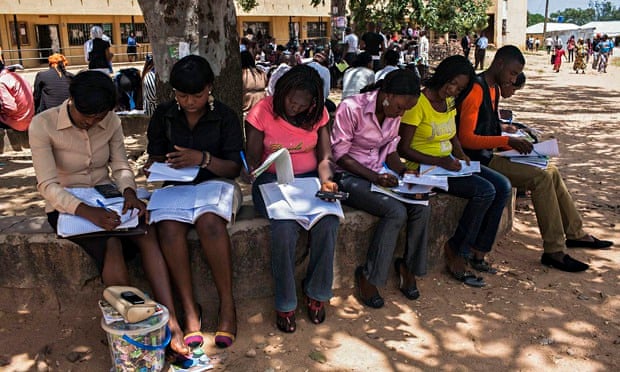General
Source: TheGuardian
Activists have accused the British government of undermining negotiations on a set of global goals that will shape the development agenda for the next 15 years, sparking fears that crucial commitments for women could be lost.
The UK is understood to be unhappy with some of the targets contained in the proposed set of sustainable development goals (SDGs) and wants to reopen negotiations.
Women's rights groups said on Thursday that renegotiating the targets at this stage could prompt renewed debate on the inclusion of targets on women's reproductive rights, still a controversial area for some governments, and violence against women. It could also result in the loss of targets on equitable trade and climate change.
 Nigerian students at work under a tree in Jos, Nigeria. Activists fear that progress on reproductive rights and gender violence could be undone. Photograph: Ruth Mcdowall/EPA
Nigerian students at work under a tree in Jos, Nigeria. Activists fear that progress on reproductive rights and gender violence could be undone. Photograph: Ruth Mcdowall/EPA
Reopening the discussions could also threaten goal 16 to promote peaceful societies, something the African bloc of countries is keen to avoid.
Sascha Gabizon, executive director of Women in Europe for a Common Future and co-facilitator of the Women's Major Group, which represents the views of women in UN processes, said: "Women and girls have much to gain from strong development goals and targets for achieving gender equality. The UK's push to reduce the scope of the SDGs could seriously undermine efforts to improve the lives of women and girls around the world."
The draft set of SDGs, formally presented to the UN general assembly in September last year, were the result of 18 months of discussions by an open working group (OWG) of 70 countries, drawing on global, national and regional consultations. It is by far the largest consultation process conducted by the UN.
The OWG has proposed 17 goals and 169 targets. Some countries, including Britain and Japan, believe there are too many goals to be effective. But others maintain that the wide spectrum of goals reflect the complexities of sustainable development.
EU countries appear broadly supportive of the 17 goals. However, the UK prime minister, David Cameron, said in September that he wanted no more than 12. The government reiterated this message last year in its statement to the environmental audit committee on the SDGs.
The Department for International Development told the committee: "Aside from being long and unwieldy, many proposed targets are unworkable or unmeasurable. If adopted, it would struggle to inspire international action, drive meaningful accountability or implementation, and would be a burden on the governments of developed and developing countries alike."
The UK is not keen on a specific climate change goal, but would prefer environmental sustainability targets to be integrated across all goals. The government is also understood to be opposed to the specific goal on inequality. It has not stated which of the goals or targets it would want removed in order to reduce the number.
The G77 group of developing countries, which represents 134 UN member states, is resisting attempts to reopen discussions on the goals that many of the countries helped draft during the OWG process.
While it was generally accepted that there was little chance of reducing the number of goals after last September, it was believed that the targets would still be open for discussion over the coming months. However, a blog on the Huffington Post in February by Macharia Kamau, one of the co-chairs of the OWG and Kenyan ambassador to the UN, appeared to put paid to that idea, suggesting that the SDGs had already been locked down.
It is understood that African countries are aligning themselves more to the G77 than their traditional donor countries in the global north. The readiness of China to invest in African countries with fewer strings attached than northern donors is believed to be a major draw for some of the continent's leaders. China, along with Brazil and India, is becoming a dominant voice in the G77 group.
Shannon Kowalski, director of advocacy and policy at the International Women's Health Coalition and another co-facilitator of the Women's Major Group, said although the proposed SDGs were not perfect, "this agenda can be truly transformative if governments commit to rights-based targets and a detailed monitoring system to track progress".
"The sustainable development goals are the strongest consensus we have in recognising women's rights and addressing the root causes of gender inequality and poverty," she added.
Speaking about inequality, Mari-Claire Price, from Realising Sexual and Reproductive Justice (RESURJ), a global alliance of young feminists, added: "Inequality and poverty are indivisible. This is true across the world, including within the UK, where the government's experimental and long impacting austerity measures continue to deepen already profound gaps between the poorest and the wealthiest of our society. For the UK government to speak of 'leaving no-one behind' in this agenda, then refuse to prioritise inequality and therefore people, is unjustifiable."
Member states will continue their negotiations on the goals next week. Focus will turn to the indicators by which the targets will be measured. It is understood 300 indicators have been drafted.
The wording of the indicators is unlikely to escape controversy. Concern has already been raised over an indicator to measure a target to eliminate violence against women and girls. The indicators just focus on women of reproductive age, between 15 and 49. HelpAge US said this week that such an indicator will ensure violence against older women remains invisible.
A DfID spokesman said: "The UK remains focused on developing a comprehensive and ambitious set of new goals that are both inspiring and workable.
"The rights and equality of girls and women are absolutely critical in the fight against chronic poverty in the developing world. We are determined to achieve a strong and dedicated goal on gender equality."
